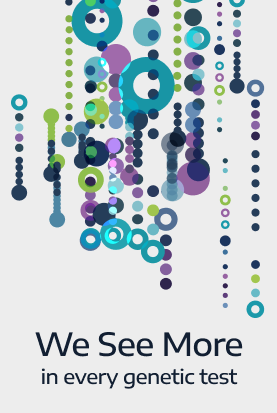Genomic Unity® Pharmacogenomics Analysis
Genomic Unity® Pharmacogenomics Analysis is a diagnostic test designed to identify common variants associated with drug metabolism and pharmacogenetics response.
- Test Description
- When to Order
- Included Analyses
- Genes and Star Alleles Tested
- CPT Codes
- Methods and Limitations
Test Description
Genomic Unity® Pharmacogenomics Analysis uses a whole genome platform that analyzes common variants associated with drug metabolism and pharmacogenetics response in 13 genes. Pharmacogenetic analysis can benefit the treatment of psychiatric, hematological, neurological, and cardiometabolic disorders, as well as pain management, infections, and cancers.
The Genomic Unity® Pharmacogenomics Analysis is based on the FDA Table of Pharmacogenetic Associations (2022). The information provided in this report does not contain medication recommendations, and any dosage adjustments or other changes to medications should be evaluated by the ordering healthcare provider with consideration of current prescriptions, family and patient’s history, presenting symptoms, and other factors.
When to Order
Order this test when the patient requires selection of treatment that might be influenced by genetic factors.
Included Analyses
- Sequence analysis of thirteen pharmacogenomic-associated genes
- Copy number variant analysis of select pharmacogenomic-associated genes (listed below)
Genes and Star Alleles Tested
| Gene | Star Allele |
|---|---|
| CYP2B6 | *1 (reference), *2, *3, *4, *5, *6, *7, *8, *9, *10, *11, *12, *13, *14, *15, *17, *18, *19, *20, *21, *22, *23, *24, *25, *26, *27, *28, *29 (CYP2B7–CYP2B6 hybrid), *30 (CYP2B6–CYP2B7 hybrid), *31, *32, *33, *34, *35, *36, *37, *38, and copy number variations (*xN). |
| CYP2C9 | *1 (reference), *2, *3, *4, *5, *6, *7, *8, *9, *10, *11, *12, *13, *14, *15, *16, *17, *18, *19, *20, *21, *22, *23, *24, *25, *26, *27, *28, *29, *30, *31, *32, *33, *34, *35, *36, *37, *38, *39, *40, *41, *42, *43, *44, *45, *46, *47, *48, *49, *50, *51, *52, *53, *54, *55, *56, *57, *58, *59, *60, *61, *62, *63, *64, *65, *66, *67, *68, *69, *70, *71 |
| CYP2C19 | *1, *2, *3, *4, *5, *6, *7, *8, *9, *10, *11, *12, *13, *14, *15, *16, *17, *18, *19, *22, *23, *24, *25, *26, *28, *29, *30, *31, *32, *33, *34, *35, *36 (Whole gene deletion), *37 (Partial gene deletion), *38 (reference), *39 |
| CYP2D6 | *1 (reference), *2, *3, *4, *5 (Whole gene deletion), *6, *7, *8, *9, *10, *11, *12, *13 (CYP2D7–CYP2D6 hybrid), *14, *15, *17, *18, *19, *20, *21, *22, *23, *24, *25, *26, *28, *29, *30, *31, *33, *34, *35, *36 (CYP2D6–CYP2D7 hybrid), *37, *38, *39, *40, *41, *42, *43, *44, *45, *46, *47, *48, *49, *50, *51, *52, *53, *54, *55, *56, *57, *58, *59, *60, *61 (CYP2D6–CYP2D7 hybrid), *62, *63 (CYP2D6–CYP2D7 hybrid), *64, *65, *68 (CYP2D6–CYP2D7 hybrid ), *69, *70, *71, *72, *73, *74, *75, *81, *82, *83, *84, *85, *86, *87, *88, *89, *90, *91, *92, *93, *94, *95, *96, *97, *98, *99, *100, *101, *102, *103, *104, *105, *106, *107, *108, *109, *110, *111, *112, *113, *114, *115, *116, *117, *118, *119, *120, *121, *123, *124, *125, *126, *128, *129, *130, *132, *133, *134, *135, *136, *137, *138, *140, *141, *142, *143, *144, *145, and copy number variations (*xN). |
| CYP3A5 | *1 (reference), *3, *6, *7, *8, *9 |
| CYP4F2 | *1 (reference), *2, *3 (V433M) |
| DPYD | Reference, c.1905+1G>A (*2A), c.1898delC (*3), c.1601G>A (*4), c.1627A>G (*5), c.2194G>A (*6), c.295_298delTCAT (*7), c.703C>T (*8), c.85T>C (*9A), c.2657G>A (*9B), c.2983G>T (*10), c.1003G>T (*11), c.1156G>T (*12), c.1679T>G (*13), c.1129-5923C>G, c.1236G>A (HapB3), c.2846A>T, c.557A>G, c.62G>A, c.496A>G, c.1218G>A, c.1896T>C, c.46C>G, c.61C>T, c.313G>A, c.343A>G, c.451A>G, c.498G>A, c.601A>C, c.632A>G, c.775A>G, c.868A>G, c.929T>C, c.934C>T, c.967G>A, c.1024G>A, c.1057C>T, c.1108A>G, c.1181G>T, c.1180C>T, c.1260T>A, c.1278G>T, c.1294G>A, c.1314T>G, c.1349C>T, c.1358C>G, c.1403C>A, c.1475C>T, c.1484A>G, c.1519G>A, c.1543G>A, c.1577C>G, c.1615G>A, c.1682G>T, c.1775G>A, c.1774C>T, c.1777G>A, c.1796T>C, c.1905C>G, c.1906A>C, c.1990G>T, c.2021G>A, c.2161G>A, c.2186C>T, c.2195T>G, c.2279C>T, c.2303C>A, c.2336C>A, c.2482G>A, c.2582A>G, c.2623A>C, c.2639G>T, c.2656C>T, c.2872A>G, c.2915A>G, c.2921A>T, c.2933A>G, c.2978T>G, c.2977C>T, c.3049G>A, c.3061G>C, c.3067C>A, c.525G>A, c.1371C>T |
| NAT2 | *4 (reference), *5, *6, *7, *10, *11, *12, *13, *14, *17, *18, *19, *20, *21, *22, *23, *24, *25 |
| NUDT15 | *1 (reference), *2, *3, *4, *5, *6, *7, *8, *9, *10, *11, *12, *13, *14, *15, *16, *17, *18, *19, *20 |
| SLCO1B1 | *1 (*1A, reference), *37 (*1B), *2, *3, *4, *5 (521C), *6, *7, *8, *9, *10, *11, *12, *13, *14, *15 (521C), *16, *19, *20, *23, *24, *25, *26, *27, *28, *29, *30, *31, *32, *33, *34, *36 |
| TPMT | *1 (reference), *2, *3A, *3B, *3C, *4, *5, *6, *7, *8, *9, *10, *11, *12, *13, *14, *15, *16, *17, *18, *19, *20, *21, *22, *23, *24, *25, *26, *27, *28, *29, *30, *31, *32, *33, *34, *35, *36, *37, *38, *39, *40, *41, *42, *43, *44 |
| UGT1A1 | *1 (reference), *6, *27, *28, *36, *37, *80, *80+*28, *80+*37 |
| VKORC1 | Reference, rs9923231 (-1639G>A) |
CPT Codes
81479, 81225, 81227, 81226, 81231, 81232, 81306, 81328, 81335, 81350, 81355
The CPT codes provided are for informational purposes only. CPT coding is the sole responsibility of the billing party. Please direct any questions regarding coding to the payer being billed.
Methods and Limitations
Genomic Unity® Pharmacogenomics Analysis uses a PCR-free whole genome sequencing (WGS) platform paired with our Genomic Intelligence® analytical software.
For tested alleles:
96% sensitivity
98% specificity
98% positive predictive value
